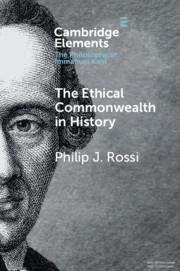Element contents
The Ethical Commonwealth in History
Published online by Cambridge University Press: 01 July 2019
Summary
- Type
- Element
- Information
- Online ISBN: 9781108529686Publisher: Cambridge University PressPrint publication: 04 July 2019
Bibliography
Primary Sources
Secondary Sources
- 15
- Cited by

